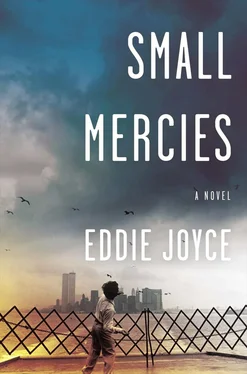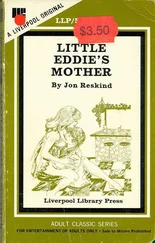The afternoon is quiet, only a handful of customers. At five o’clock, Enzo looks outside to make sure no one else is coming and then turns the sign from OPEN to CLOSED. Michael sweeps up while Enzo counts at the register. He licks his fingers between bills, counts out the change, checks the scraps of paper where he tracks his customers’ accounts on credit. He does some math on another scrap, concentrates while he’s adding. When he’s finished, he looks up at Michael and smiles.
“ Una buona giornata ,” he says. “A good day.”
* * *
His parents are more chatty at dinner, their tongues loosened by a few glasses of Umberto’s wine. His mother asks about their day and Enzo re-creates, in meticulous detail, the not very exciting day they just experienced. Michael lived the day in English and now he has to relive in it in Italian. He inhales long strands of linguine coated with garlic and oil. He downs the glass of wine, asks to be excused. His parents look at him, then at each other, uncertain what to make of their son’s recent restlessness. He retreats to his bedroom even though the sun is still up. He was supposed to hang out with Tiny tonight, but Tiny is spending almost every night with his girlfriend Laura Gentile. Tiny is off to college in the fall and he has sworn to Michael that he is getting into Laura’s pants before he leaves. Michael wishes he had a girlfriend, had some goal to pursue, even something as basic as trying to get laid. He turns on the radio, lies on his bed. The Mets are playing the traitor Giants, Marichal is pitching. There’s no score yet.
He misses baseball, misses football too. Being part of a team, the simple joy of camaraderie. The brothers he never had. That is all done now. There is no school to return to in the fall. No college lies in the distance. He was never a good student, but school was, at least, somewhere to go, something to do. And nothing made him feel the way sports did.
He is eighteen years old and as far as he can tell, all his days going forward will be the same: the waking jab, the silent house, long days at his father’s shop, cutting up meat, coming home smelling of blood. Unless.
Unless what? He doesn’t know. He doesn’t have a plan, but he has blind hope. Maybe something will happen. Maybe a man will wander into the store, like the look of him, offer him a job. Maybe he can take another look at college, take some classes at night. Maybe he can help out coaching football at New Dorp in the fall. Maybe Lisa Villa will ask him to stop staring at her tits and just screw her already. He lets these hopes, vague and unformed and ridiculous, brighten his day’s final thoughts.
But the next morning, his slumber is disrupted by a gentle jab of his shoulder. He slides to a sitting position. His hopes have vanished in the night, leaving a resigned emptiness in their wake.
This is your life. This will be your life unless…
Something happens. He draws a very low draft number. He’d considered enlisting — anything to get away from an endless line of buona giornatas —but the conflict in Vietnam, slowly escalating, made him hesitant. He’s doesn’t want to go, but he’s no dummy. He knows when something’s inevitable. He’s a working-class kid, 1A, no deferments to use, no evasive magic to conjure. His parents have no connections, no strings to pull. He figures it’s a matter of time anyway. He volunteers for the draft. In October 1964, a month before the Verrazano Bridge opens, he ships out to Fort Sill in Oklahoma for basic training.
His first night there is the first night he’s ever slept off of Staten Island.
* * *
Down in the kitchen, Michael finds a freshly brewed pot of coffee. He pours himself a cup, sits down at the table. His entry sheet lies below an envelope filled with crumpled twenties. Gail has filled in a few. He picks it up, takes a sip of coffee, peruses her entries. She always has too many underdogs, too many high seeds making the Final Four. This year’s no different.
Who’s he kidding? He’s never won the pool, never even come close. Doesn’t matter; it’s a tradition. Today’s little expedition — collecting all the entries from the Leaf, driving them over to Cody’s — is one of his favorite days of the year. Bobby used to come with him, the young pup hanging out with the old-timers. Franky would meet them at Cody’s. Peter could never get away from work, but Bobby would still collect his entries, call him when there was a sense of the total number. Two hundred thousand, half a million, seven hundred thousand. Up, up, up. Never mind the economy. The Cody’s pool was recession proof.
Michael has a different plan this year. He’s going back to the way they used to do it, when the boys were kids, when the pool was just starting to spread across the Island. He and the boys would each pick one Final Four team. Then Gail would choose the winner and the final score. Only one entry for the whole family. They would watch the games together, the boys living and dying with every missed free throw, every sloppy turnover. As soon as one of their teams lost, the boys would be despondent, but Michael didn’t mind. He didn’t expect to win. The tradition — the ceremony — was what mattered. Relying on one another, everyone contributing. A team effort. They fell away from that over the years. They wanted to put in their own entries, put in a bunch of entries, increase their chances of winning.
He likes the way they used to do it. And he’s thought of an added bonus: doing it this way will help keep Tina in the loop, part of the family. Tina can make Bobby’s pick. Or maybe she can have Bobby Jr. make it. Doesn’t matter. Gail told Michael last night about Tina’s new man. He’s happy for Tina, but he knows Gail’s worried about what it means. This is a way to ensure that Tina stays included in the family. It’s only a little thing, he knows that. But the ceremony means something. It’ll mean something to Tina and to Gail. They’ll understand.
He looks down, inspecting the sheet. He’ll pick the first team, from the East bracket. He checks the high seeds: Ohio State, North Carolina, Syracuse, Kentucky. He’s never liked the coach at Syracuse. Too much of a whiner. He looks further down to see if there are any other Big East teams: Villanova’s a 9 seed, Marquette, an 11. Long shots. Hmm. Kentucky’s coach is an Italian. He’ll stick with the paesan. Kentucky it is. He enters his choice on the last line of the sheet, so he’ll know which one is the family entry.
Peter always chose second. There’s no time to go see him, so he’ll call. He puts on his glasses. He picks up the house phone, realizes he has no idea what Peter’s number is. He looks around on the cork board that hangs near the fridge, finds a weathered slip of paper—“Peter’s office #” scribbled in Gail’s handwriting — tacked under a grocery list. He dials the number. A receptionist answers.
“Peter Amendola’s office.”
“Yeah, uhh, can I talk to Pete? It’s his father.”
“Hold one moment.”
The line goes quiet for a few seconds. When Peter picks up, his voice is sharp.
“What’s wrong? Is Mom okay?”
“What? No, Peter…”
“Are you okay?”
“I’m fine. Listen…”
“Oh, Christ, what did he do now?”
“Who?”
“Franky.”
“Franky didn’t do anything. Jesus Christ, Peter, calm down.”
“I am calm. So everyone’s okay?”
“Yes, why would you assume something was wrong?”
He hears Peter exhale.
“Dad, in all the time I’ve worked here, I think you’ve called me three times. One was when Grandpa died. The other was when Franky got arrested. This is the third.”
“I don’t think that’s right.”
“You’re right. You called me once from the Leaf to settle an argument about whether someone could sue the Interweb, as you put it.”
Читать дальше












